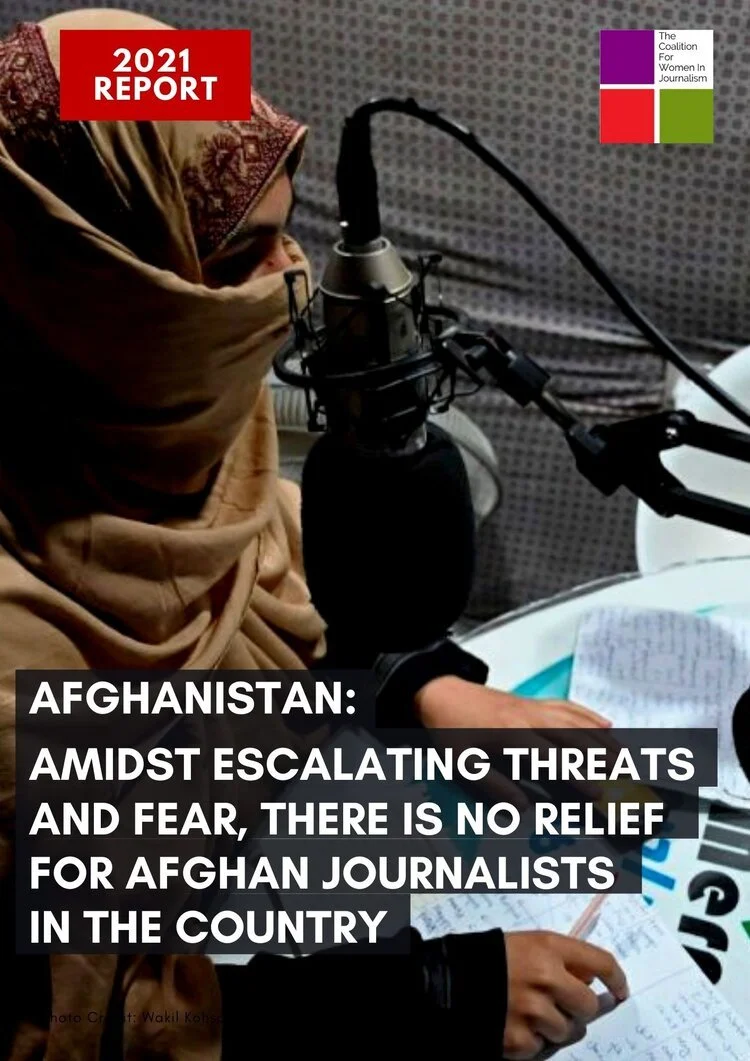Afghanistan: Amidst Escalating Threats and Fear, There Is No Relief For Afghan Journalists in The Country
After a bomb attack at the Kabul airport on August 26 left more than 170 people dead, the situation for Afghan women journalists is deteriorating. Three journalists, including one woman journalist, were among the casualties. Najma Sadeqi, a young Afghan YouTuber from the Afghan Insider channel, was completing her last semester of journalism school. She hoped to flee the country and find somewhere safe to practice journalism. Najma had dreams of a career in media despite the many threats she endured. Her sister Freshta shared that Najma had a compilation of threatening texts from the Taliban that she was planning to show Afghan journalists. The young journalist was at the airport trying to secure an evacuation flight when the bomb was detonated. The blast killed Najma, her brother, and a cousin who accompanied her to ensure her safety. Jihad Hamidi, an AIJA reporter, also lost his life in the attack. Another prominent journalist, Ali Reza Ahmadi, a correspondent for Raha news agency, was also killed in Thursday’s attack.
According to the latest updates, a number of women journalists are stuck at different points, taking shelter in homes, buses, safe houses— wherever they can stay out of danger. Some have toddlers and family to feed, but there is no reprieve from the circumstances they are facing. The escalating security threats have further derailed the already slow process of evacuation. The attack on Kabul airport was claimed by ISKP (Islamic State in Khorasan Province), which reportedly singled out the collaborators and translators who worked with the U.S. forces. This targeted execution exemplifies how women journalists may suffer if they remain in the country under the Taliban's rule.
SA, an accomplished woman journalist, had tickets for a flight out of the country, but she was unable to enter the airport with the thousands of people crowded outside. For now, she has to wait for another day to safely ride back to the airport and try to pass the several security checkpoints. She shared in a statement, "People are running, and there was an explosion at the airport. We are in danger. If the Taliban come to my place and ask me some questions, they might know about things I wrote on Facebook or I said in interviews. What would be their reaction? Of course, they will kill me."
SA further stated that she has suffered sexual assault at the road stops where she was requested to show her documents. Two or three men touched her inappropriately, which they have allegedly done to other women as well.
Reaching Kabul airport has become extremely dangerous for any journalist, activist, or collaborator as security checkpoints are being monitored by Taliban insurgents. Certain international networks were able to evacuate some of the local staff, but the evacuation process has become increasingly dangerous due to the threats of further attacks. Journalists seeking to flee the country use informal networking modes to connect with the international aid organizations trying to help.
Another female journalist shared a video message while keeping her identity hidden, "They are checking the people who always talked against them. Every day, I am changing my location to be sure that they don't chase me. I have no idea what will happen to me because if they find me, they will kill me." The journalist revealed she has always spoken openly against the Taliban for its mistreatment of women and the atrocities committed against civilians in the country. She said that Taliban insurgents burned and killed them.
To date, the Taliban have managed to shut down 90 media outlets. They are tightening their grip around press freedom, which further threatens journalists working in Afghanistan.
Khushbu Shah, associated with The Fuller Project, shared in a tweet, "Our colleague was robbed by armed men on the way to Kabul airport Sunday. They stole her cash, passports & docs. Zainab got herself onto this plane…"
Another woman journalist, MH, quit her job when the threatening calls wouldn't stop. She was working in Jalalabad at the time of the harassment. She recounted, "For many months now, I have been receiving threatening calls from Taliban who were asking me to quit my job. They would tell me, you are a Muslim woman, and you are working in a place that has men. If you want to remain safe and live with honor, quit your job." MH said she didn't take such calls seriously until she saw the murder of three women journalists. She destroyed her SIM, but the Taliban entered her neighborhood with a biometric device and were checking people’s documents. MH said that whoever the Taliban identified, they apprehended and took with them.
Our colleague was robbed by armed men on the way to Kabul airport Sunday. They stole her cash, passports & docs. Zainab got herself onto this plane. In partnership with @RukhshanaMedia, @TIME & @FullerProject, the story of loss women face in Afghanistan: https://t.co/hBVdptZNpb pic.twitter.com/vIY4LJdVrs
— Khushbu Shah (@KhushbuOShea) August 20, 2021
Amid the chaos, several Afghan women journalists have managed to flee the country. While many journalists are sad to leave their home, there is no safe way to stay for those at-risk. Mexico has coordinated the arrival of 100 Afghan journalists and their families. Several other countries are also being pushed by their respective press freedom organizations to expedite further efforts.
We call on the international community to join efforts and facilitate the safe departure of vulnerable Afghans from the country. At this time, it is critical to support Afghan journalists, particularly women, who are desperately trying to flee.
If you would like to request more insight into our findings, or would like to suggest an addition to our work reach out to us at data@womeninjournalism.org. For media inquiries reach out to us at press@womeninjournalism.org.
